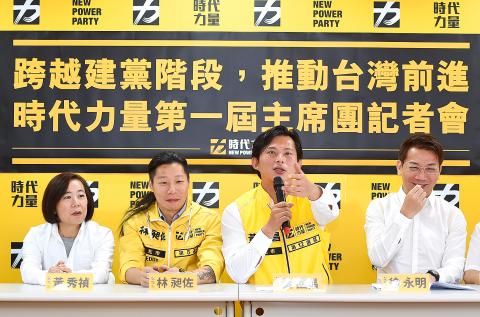The New Power Party (NPP) yesterday announced its new leadership lineup — a seven-member board of chairpersons that it said could prevent abuse of power and encourage participatory democracy — and vowed to win 10 percent of the at-large vote in January’s legislative elections.
The chairpersons are the party’s three legislative candidates — Academia Sinica researcher Huang Kuo-chang (黃國昌), musician Freddy Lim (林昶佐) and author/playwright Neil Peng (馮光遠) — Soochow University political science professor Hsu Yung-ming (徐永明), lawyers Huang Hsiu-chen (黃秀禎) and Lin Feng-jeng (林?正) and author Lin Shih-yu (林世煜).
They were elected last week by 427 party members through an online poll, with Huang Kuo-chang topping the poll with a 76.11 percent support rate.

Photo: Liao Chen-huei, Taipei Times
The new board yesterday held its first meeting, during which Huang Kuo-chang was elected NPP executive chairman.
Hsu said the party’s Decision-making Committee would consist of the seven-member board and eight members from the party’s executive and policy committees, which would prevent authoritarian rule by a single chairperson and encourage direct participation of party members.
Traditionally, when in office, the Chinese Nationalist Party (KMT) and the Democratic Progressive Party have had the president also serve as the party’s chairperson, which allows the president to interfere with the legislature by manipulating party affairs and reduces the legislature’s oversight power, Haung Kuo-chang said.
“I would not become a permanent executive chairperson, as elections for the board of chairpersons is to be held after each major national poll or when one-sixth of the party members demand it.” Huang Kuo-chang said.
“There will be another election after the legislative polls next year,” he said.
The NPP’s executive chairperson is to act as the party’s spokesperson, and would not have the power to control the distribution of resources or party administration, he said, adding different policy committees are to be formed along the lines of the Legislative Yuan’s committees.
He said the party plans to announce the rest of its candidates for district legislative seats as well as a slate of at-large candidates by the end of the month.
Participation by non-member voters would be factored in the selection and ranking of the NPP’s at-large candidates, as candidates have to seek mandate by communicating with local constituents about the NPP’s objectives and the priority bills they would push for if elected, before the party conducts an online poll to gauge the various hopefuls’ support rates, Haung Kuo-chang said.
That would provide voters with the opportunity to directly participate in the NPP’s decisionmaking process, he said.
The NPP has a support rate of about 10 percent in Taipei and New Taipei City, which it expects could translate into votes, he said.

A preclearance service to facilitate entry for people traveling to select airports in Japan would be available from Thursday next week to Feb. 25 at Taiwan Taoyuan International Airport, Taoyuan International Airport Corp (TIAC) said on Tuesday. The service was first made available to Taiwanese travelers throughout the winter vacation of 2024 and during the Lunar New Year holiday. In addition to flights to the Japanese cities of Hakodate, Asahikawa, Akita, Sendai, Niigata, Okayama, Takamatsu, Kumamoto and Kagoshima, the service would be available to travelers to Kobe and Oita. The service can be accessed by passengers of 15 flight routes operated by

MORE FALL: An investigation into one of Xi’s key cronies, part of a broader ‘anti-corruption’ drive, indicates that he might have a deep distrust in the military, an expert said China’s latest military purge underscores systemic risks in its shift from collective leadership to sole rule under Chinese President Xi Jinping (習近平), and could disrupt its chain of command and military capabilities, a national security official said yesterday. If decisionmaking within the Chinese Communist Party has become “irrational” under one-man rule, the Taiwan Strait and the regional situation must be approached with extreme caution, given unforeseen risks, they added. The anonymous official made the remarks as China’s Central Military Commission Vice Chairman Zhang Youxia (張又俠) and Joint Staff Department Chief of Staff Liu Zhenli (劉振立) were reportedly being investigated for suspected “serious

ENHANCING EFFICIENCY: The apron can accommodate 16 airplanes overnight at Taoyuan airport while work on the third runway continues, the transport minister said A new temporary overnight parking apron at Taiwan Taoyuan International Airport is to start operating on Friday next week to boost operational efficiency while the third runway is being constructed, the Ministry of Transportation and Communications said yesterday. The apron — one of the crucial projects in the construction of the third runway — can accommodate 16 aircraft overnight at the nation’s largest international airport, Minister of Transportation and Communications Chen Shih-kai (陳世凱) told reporters while inspecting the new facility yesterday morning. Aside from providing the airport operator with greater flexibility in aircraft parking during the third runway construction,

American climber Alex Honnold is to attempt a free climb of Taipei 101 today at 9am, with traffic closures around the skyscraper. To accommodate the climb attempt and filming, the Taipei Department of Transportation said traffic controls would be enforced around the Taipei 101 area. If weather conditions delay the climb, the restrictions would be pushed back to tomorrow. Traffic controls would be in place today from 7am to 11am around the Taipei 101 area, the department said. Songzhi Road would be fully closed in both directions between Songlian Road and Xinyi Road Sec 5, it said, adding that bidirectional traffic controls would